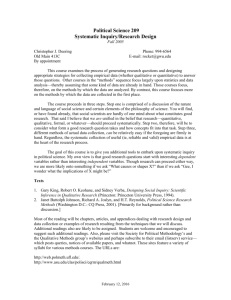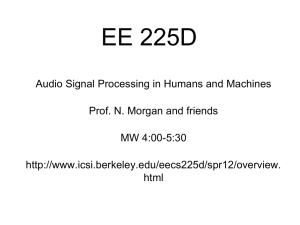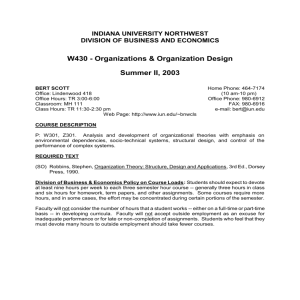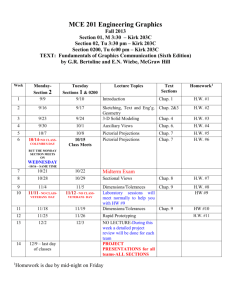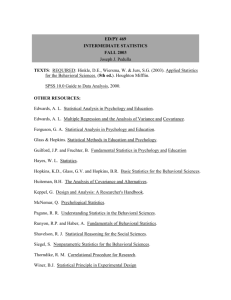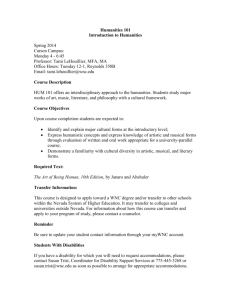SyllabusFall 2004
advertisement
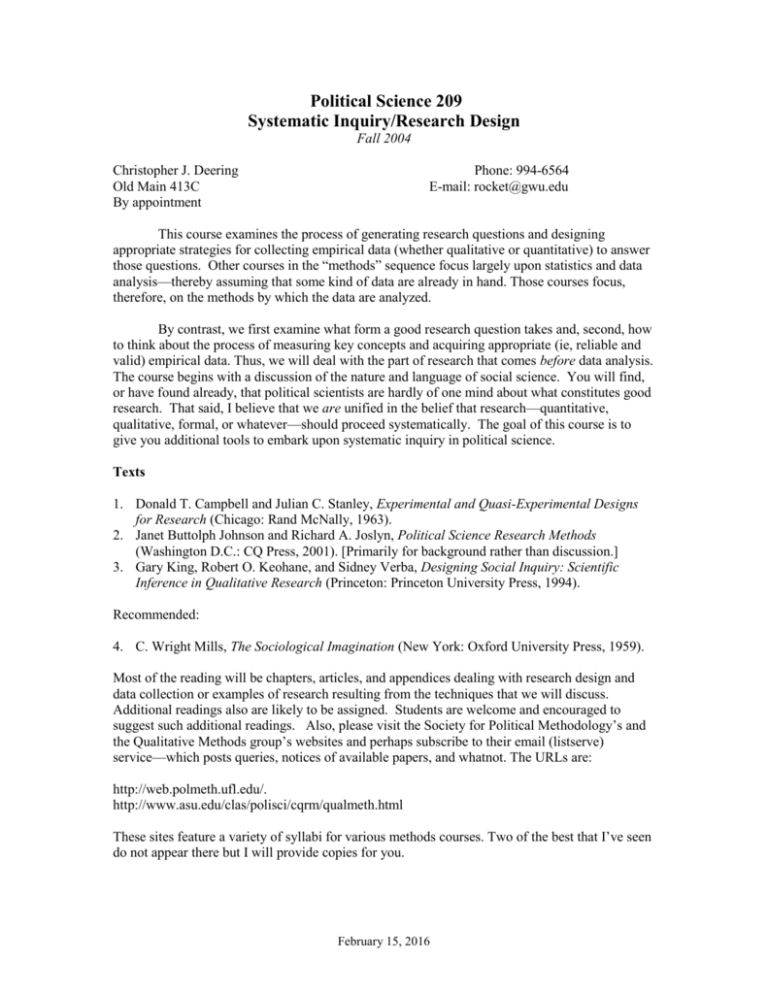
Political Science 209 Systematic Inquiry/Research Design Fall 2004 Christopher J. Deering Old Main 413C By appointment Phone: 994-6564 E-mail: rocket@gwu.edu This course examines the process of generating research questions and designing appropriate strategies for collecting empirical data (whether qualitative or quantitative) to answer those questions. Other courses in the “methods” sequence focus largely upon statistics and data analysis—thereby assuming that some kind of data are already in hand. Those courses focus, therefore, on the methods by which the data are analyzed. By contrast, we first examine what form a good research question takes and, second, how to think about the process of measuring key concepts and acquiring appropriate (ie, reliable and valid) empirical data. Thus, we will deal with the part of research that comes before data analysis. The course begins with a discussion of the nature and language of social science. You will find, or have found already, that political scientists are hardly of one mind about what constitutes good research. That said, I believe that we are unified in the belief that research—quantitative, qualitative, formal, or whatever—should proceed systematically. The goal of this course is to give you additional tools to embark upon systematic inquiry in political science. Texts 1. Donald T. Campbell and Julian C. Stanley, Experimental and Quasi-Experimental Designs for Research (Chicago: Rand McNally, 1963). 2. Janet Buttolph Johnson and Richard A. Joslyn, Political Science Research Methods (Washington D.C.: CQ Press, 2001). [Primarily for background rather than discussion.] 3. Gary King, Robert O. Keohane, and Sidney Verba, Designing Social Inquiry: Scientific Inference in Qualitative Research (Princeton: Princeton University Press, 1994). Recommended: 4. C. Wright Mills, The Sociological Imagination (New York: Oxford University Press, 1959). Most of the reading will be chapters, articles, and appendices dealing with research design and data collection or examples of research resulting from the techniques that we will discuss. Additional readings also are likely to be assigned. Students are welcome and encouraged to suggest such additional readings. Also, please visit the Society for Political Methodology’s and the Qualitative Methods group’s websites and perhaps subscribe to their email (listserve) service—which posts queries, notices of available papers, and whatnot. The URLs are: http://web.polmeth.ufl.edu/. http://www.asu.edu/clas/polisci/cqrm/qualmeth.html These sites feature a variety of syllabi for various methods courses. Two of the best that I’ve seen do not appear there but I will provide copies for you. February 15, 2016 Course Requirements The fundamental requirement for this course is a careful reading of the assigned material leading to informed discussion each week. No student can do well in this course without effective oral participation. This should not be confused with loud, frequent, or extended participation. Throughout the course there will be several smallish assignments. The major product for the course, however, will be to design and present to the class a proposed piece of research. This will be formally presented but need not (should not?) be too broad in scope. The research must be based in an existing literature, contain formally stated hypotheses, and include a plan for executing the research (concept identification, measurement, and data collection method). In order to provide early feedback to the student, this may be undertaken in an iterative fashion. Course evaluations are, therefore, based upon class participation, the written work, and a final exam. Course Schedule and Reading Assignments 1. Sept. 13 Introduction Johnson and Joslyn, Chap. 1. King, Keohane, and Verba, Chap. 1. American Political Science Association, Style Manual for Political Science (Washington, DC: APSA, 2001). 2. Sept 20 The Idea of a Social Science I Facts, impressions, and concepts in society. Assignment: Please bring in one article, not from APSR, from a major, peer-reviewed, journal in your subfield. Peter Winch, The Idea of A Social Science (London: Routledge & Kegan Paul, 1958), Chaps. 3 and 5. Alasdair MacIntyre, “The Idea of a Social Science,” in Ryan, The Philosophy of Social Explanation (Oxford, 1973): 15-32. Maurice Mandelbaum, “Societal Facts.” In Ryan, The Philosophy of Social Explanation. (Oxford University Press, 1973): 105-118. C. Wright Mills, The Sociological Imagination (Oxford, 1959), Chaps. 1-3, and 6. Johnson and Joslyn, Chap. 2. 3. Sep. 27 The Idea of a Social Science II Is political science history? Is history a social science? J. B. Bury, The Idea of Progress: An Inquiry Into Its Origin and Growth (London: Macmillan and Co., 1928), “Introduction.” E.H. Carr, What Is History? (New York: Knopf, 1962), Chaps. 3-4 Alfred W. Crosby, The Measure of Reality: Quantification and Western Society, 1250-1600 (Cambridge: Cambridge University Press, 1997). John Keegan, The Face of Battle: A Study of Agincourt,Waterloo, and the Somme (New York: Penguin Books, 1976), Chap. 1. C. Wright Mills, The Sociological Imagination (Oxford, 1959), Chaps. 8 and 10, February 15, 2016 and the Appendix. 4. Oct. 4 Hypotheses and Theories I What’s all this about falsification and the null hypothesis? Johnson and Joslyn, Chaps. 3 and 5. King, Keohane, and Verba, Chap. 2. Karl Popper, The Logic of Scientific Discovery [1934] (Basic Books, 1959), Chaps. 1 and 4. Imre Lakatos, “Falsification and the Methodology of Scientific Research Programmes,” from Lakatos, et. al., Criticism and the Growth of Knowledge (Cambridge: Cambridge University Press, 1970). Online at the following url: http://www.philosophy.ru/edu/ref/sci/lakatos.html Lee Sigelman, “Publication Bias Reconsidered.” Political Analysis 8 (Spring 2000): 201-210. Available via in PDF format: http://www.westviewpress.com/politicalanalysis/vol8no2/PA82-[201-210].pdf James D. Fearon, “Counterfactuals and Hypothesis Testing in Political Science.” World Politics. 43 (January 1991): 169-195. Nelson W. Polsby, ed. What If? Explorations in Social-Science Fiction (Lexington, Mass.: The Lewis Publishing Company, 1982). Excerpts. 5. Oct. 11 Theories and Hypotheses II What does Maltzman mean when he says: I have a theory? Part I of paper due – problem introduction, dependent variable, and literature niche. Charles A. Lave and James G. March, An Introduction to Models in the Social Sciences (New York: Harper & Row, 1975), Chaps. 1-3. Morris P. Fiorina, “Formal Models of Political Science.” American Journal of Political Science 19 (February 1975): 133-159. Albert O. Hirschman, “The Search for Paradigms as a Hindrance to Understanding.” World Politics 22 (April 1970): 329-343. Graham T. Allison, Essence of Decision: Explaining the Cuban Missile Crisis (Boston: Little, Brown, 1971): 1-9, 245-263. 6. Oct. 18 Concepts and Measurement Trying to get a handle on stylized facts, factoids, and indicators. Johnson and Joslyn, Chap. 4. King, Keohane, and Verba, Chap. 5. Selltiz, Wrightsman, and Cook, “General Problems of Measurement,” Research Methods in Social Relations (Holt, Rinehart, and Winston). Arthur L. Kalleberg, “Concept Formation in Normative and Empirical Studies: Toward Reconciliation in Political Theory.” American Political Science Review. 63 (March 1969): 26-39. Robert Adcock and David Collier, “Measurement Validity: A Shared Standard for Qualitative and Quantitative Research.” American Political Science Review. 95 (September 2001): 529-546. 7. Oct. 25 Causality, Inference, and Interpretation Every time the Queen of England comes here it rains. The Queen of England February 15, 2016 causes rain. Campbell and Stanley, pp. 1-6 King, Keohane, and Verba, Chap. 3. Andrew Bennett and Alexander George, “Process Tracing in Case Study Research,” Paper presented at the MacArthur Foundation Workshop on Case Study Methods, Harvard University, October 17-19, 1997. Herbert M. Kritzer, “The Data Puzzle: The Nature of Interpretation in Quantitative Research,” American Journal of Political Science 40 (February 1996): 1-32. John Allen Paulos, Once Upon a Number: The Hidden Mathematical Logic of Stories (New York: Basic Books, 1998). Introduction and Chap. 1. 8. Nov. 1 Experimental and Quasi-Experimental Designs Why doesn’t social science have a Bunsen burner? Johnson and Joslyn, Chap. 5. Campbell and Stanley, pp. 6-76. King, Keohane, and Verba, Chap. 6. Albert D. Cover and Bruce S. Brumberg, “Baby Books and Ballots: The Impact of Congressional Mail on Constituent Opinion.” American Political Science Review. 76 (June 1982): 347-359. 9. Nov. 8 Comparison as Method and Comparative Methods They’re all Italians, what’s the problem? Alasdair C. MacIntyre, Against the Self-Images of the Age (Schocken Books, 1971): 260-279. Arend Lijphart, “Comparative Politics and the Comparative Method.” American Political Science Review 65 (September 1971): 682-693. Robert D. Putnam, Making Democracy Work (Princeton, 1993), Chaps 1, 3, and Appendixes A-F. Arthur L. Kalleberg, “The Logic of Comparison: A Methodological Note on the Comparative Study of Political Systems.” World Politics. 19 (October 1966): 6982. 10. Nov. 15 Case Studies and Case Selection I One is an anecdote, two are data. King, Keohane, and Verba, Chap. 4 Achen and Snidal, “Rational Deterrence Theory and Comparative Case Studies,” 41 World Politics (Jan. 1989): 143-169. Barbara Geddes, “How the Cases You Choose Affect the Answers You Get: Selection Bias in Comparative Politics,” in Political Analysis, ed. James A. Stimson. Ann Arbor: University of Michigan Press. 131-150. Collier and Mahoney, “Insights and Pitfalls: Selection Bias in Qualitative Research,” World Politics 49 (Oct. 1996): 56-91. 11. Nov. 22 Survey Designs February 15, 2016 What do people think in Washington? Well I asked this cab driver and…. Review Putnam. Johnson and Joslyn, Chap. 7 Johnson and Joslyn, Chap. 10, pp. 266-294. Selltiz, Wrightsman and Cook, Appendix B, “Questionnaire Construction and Interview Prodedures,” pp. 541-573. Earl Babbie, “Conceptualization and Instrument Design,” Survey Research Methods (Belmont, Ca: Wadsworth, 1973). Deborah D. Avant and James H. Lebovic, “Reconciling Culture and Change: Attitudes of U.S. Officers Toward Post-Cold War Missions” (Manuscript 1998). Also read and critique the Avant questionnaire. 12. Nov. 29 Elite Interviewing for Cases and Samples A senior Pentagon official told me…… Johnson and Joslyn, Chap. 10, pp. 261-266. Joel D. Aberbach, James D. Chaney, and Bert A. Rockman, “Exploring Elite Attitudes: Some Methodological Issues,” 2 Political Methodology (1975): 1-27. Richard F. Fenno, Jr. “The House Appropriations Committee as a Political System: The Problem of Integration.” American Political Science Review 56 (June 1962): 310-324. Fenno’s interview notes are available on line. Visit, explore, and read interview notes at http://nara.gov/nara/legislative/fenno1.html 13. Dec. 6 Field Studies and Participant Observation Professor Whyte, Professor Liebow, meet Professor Fenno. Johnson and Joslyn, Chap. 8. Richard Fenno, Home Style: House Members in Their Districts Read the APSR article and the Appendix to the book. Cynthia McClintock, Peasant Cooperatives and Political Change in Peru (Princeton, 1981): Chap. 4. 14. Dec. 8? Presentation and Discussion of Research Designs Writing Political Science Johnson and Joslyn, Chap. 14. Sodaro, Guidelines for writing research papers. Martha Finnemore, National Interests In International Society (Ithaca: Cornell University Press, 1996), Chap 1. February 15, 2016
